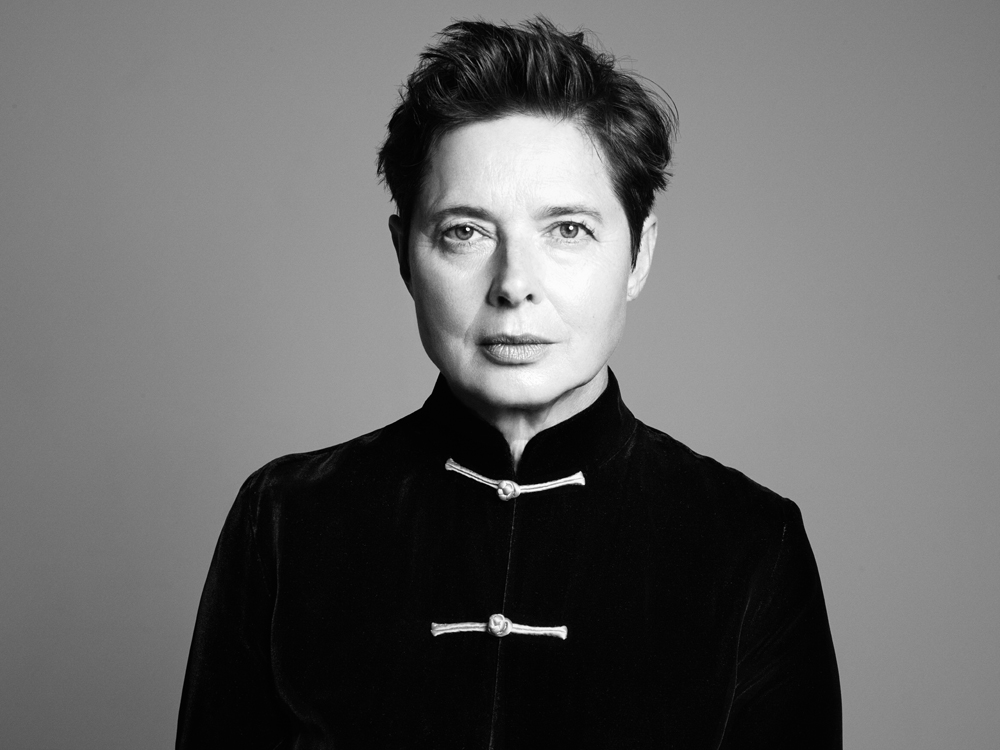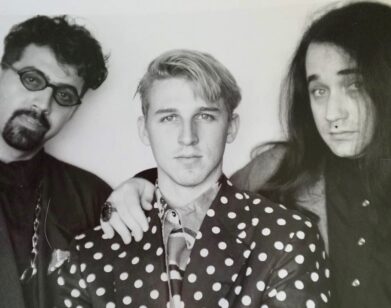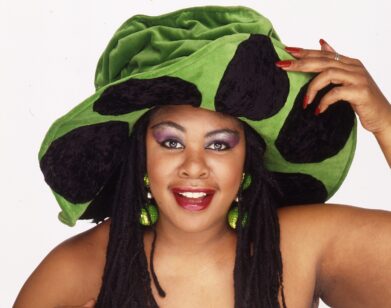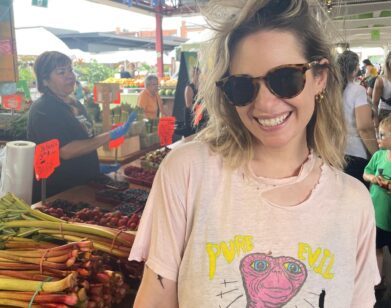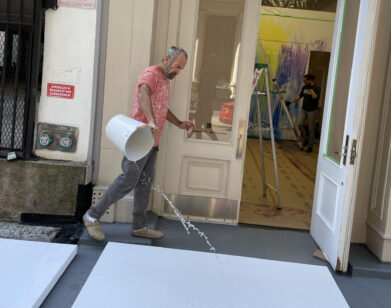Isabella Rossellini
Since I was a little girl, they’ve asked me to redo films of my mom’s, and I’ve said no . . . I’ve always said no. But then when I created my first film, I played my mom. Isabella Rossellini
Isabella Rossellini’s father, Roberto Rossellini, was the great titan of mid-century Italian cinema—a creator and the greatest practitioner of the classical neo-realist style. And her mother, well, her mother, Ingrid Bergman, is among the greatest actresses of all time. But Isabella, who was born in Rome in 1952, didn’t enter her own careers—plural, for there have been several—through the vast entryways that her parents left open to her. Instead she snuck, stumbled, wandered, and wondered her way into creating something utterly her own, something wholly representative of her tastes, her appetites, and beliefs. And we are all the richer for it.
After moving to New York in 1971, Rossellini, then 28, sort of happened to be photographed by Richard Avedon, and the picture happened to land on the cover of Vogue. It caused something of a sensation, and for years thereafter, Rossellini was one of the most coveted and iconic supermodels of the era. Her breakthrough role as a masochistic nightclub singer in David Lynch’s surrealist procedural thriller Blue Velvet (1986) propelled her into a kind of indie actordom. And in nearly 30 years hence, she’s gone on to make some of the oddest, most wonderful and unique movies, with filmmakers including Peter Weir, Lawrence Kasdan, Guy Maddin, and recently, Denis Villeneuve. Just as Blue Velvet began with the camera diving down between the blades of grass of a suburban lawn, zooming in microscopically to see what’s hidden there, Rossellini’s recent shows for the Sundance Channel, Green Porno, Seduce Me and Mammas, dig into the secret doings of the natural world, to examine the mating habits, courtship, and methods of motherhood, respectively, to be found there. The shows are a part of Rossellini’s wider plot to get closer to the earth—and its unexpected success, another instance of happy coincidence in the writer-director-actress’s life. As she tells her friend and fellow foodie, super-chef Mario Batali, her own particular recipe has called for a dash of doubt, a fear of boredom, and a liberal amount of luck.
ISABELLA ROSSELLINI: Hi, Mario! I just ate, deliciously and a lot, at Lupa [Batali’s Roman trattoria in New York], where you and I first met. You know, that name was the nickname of Anna Magnani, the great actress who worked with my dad. They called her La Lupa because she represented Rome. She was a strong woman.
MARIO BATALI: Did she have large, pendulous breasts?
ROSSELLINI: [laughs] No! She was not one of the superdotatas, like Sophia Loren and Gina Lollobrigida. She was more real—and very natural in her acting. But she was nicknamed after the she-wolf that we believe suckled the twins Romulus and Remus, who founded Rome. Everywhere in Rome, you have the she-wolf with these big breasts, breast-feeding two babies.
BATALI: Someone sent me a painting they’d made of her when we opened Lupa and said, “This woman is exactly what your restaurant’s about.” Have you noticed, in our logo at Lupa, the u is actually a breast?
ROSSELLINI: [laughs] Yes, I did notice.
BATALI: We’ve always embraced those breasts.
ROSSELLINI: I bet you do. There is a Roman feel to the restaurant. There were a lot of things on the menu that you don’t find even in Italian restaurants, very typical Roman dishes, and I appreciate it because I’m from Rome.
BATALI: How long did you live in Rome?
ROSSELLINI: I was born there and then my parents divorced when I was about 4 or 5 years old, so we moved to Paris during this long divorce and separation. For years, we lived in the Hotel Raphael, which is one of these old, very beautiful hotels with a long, black-and-white marble floor and a red carpet over it. I loved going in the beautiful entrance. There was always something happening in the lobby. My dad would come and work in Paris, and my mom was at a theater there. I lived in Paris until I was 8 years old and then I went back to Rome.
BATALI: Did you like Paris?
ROSSELLINI: It didn’t make any difference to me as a little girl. I had a bedroom and a living room. Later we moved to a house and there was no room service.
BATALI: [laughs] Right. At this point in my life, with my tiniest bit of notoriety, I must say that I prefer to go to hotels without a big lobby, because it means I don’t really bump into as many people. When you go to hotels now, do you like to stay in the grand hotels with the big lobbies?
ROSSELLINI: I like the new, boutique style. But the Hotel Raphael is so old that there was this beautiful, decorated corridor with entrances to the restaurant or the bar on the sides. It wasn’t a big lobby with lines of people trying to pay their bills.
BATALI: It’s my 20th wedding anniversary this year, and I’m taking my wife to Paris—it’s still a surprise. Normally, she likes to stay in boutique-y hotels on the Left Bank in Paris, where there’s no lobby and, in my opinion, the rooms are too small. So we’re staying at the Bristol, in one of those top-floor suites with the big outdoor gardens.
ROSSELLINI: But the Bristol is on the Right Bank!
BATALI: That’s part of the problem of my sell. But it feels really swanky and old-school.
I like to take things from zero AND make something out OF IT. BUT THEN WHEN they BECOME SOMETHING, I GET BORED. Isabella Rossellini
ROSSELLINI: It’s wonderful. I used to have an apartment in Paris, not far from the Bristol, because I like that neighborhood—all the big museums, the Grand Palais, the Louvre.
BATALI: So when you lived in Paris as a kid, you saw your dad a lot. And then you moved to Rome. Did you continue to see your mom a lot?
ROSSELLINI: Yes. My mama would come and stay with us. My parents traveled a lot, so they set up a sort of a camp with the kids. By then I was 8 and the school was getting to be difficult. And they wanted us to go to school regularly, to have our friends. And, as you know, in Italy, a family is not just Mommy and Dad, but grandmother, cousins … Everybody takes care of the children, not just the parents. And my grandmother moved in with us.
BATALI: So who cooked?
ROSSELLINI: We had a wonderful lady. She had a very strange name, Argenide, which is an old Roman name. Argenide was a nanny, and she cleaned the house and cooked delicious food. She had a son. She was a widow—her husband was a farmer who got killed in a tractor accident, which I hear is quite common. She came to live in the city as a housekeeper, with a little son who was my age, so I grew up with a grand little friend. His name is Orlando, like Orlando the Virginia Woolf novel. He works in films too. He dubs films into Italian. But he also has the most delicious organic olive oil. He inherited it when his father died. The government allocated 20 acres to him if he would remain a farmer, and he converted it into olive trees because they don’t require a lot of attention.
BATALI: In Lazio?
ROSSELLINI: Yes, in northern Lazio, near Tuscany. He still sends me his oil every year, and that’s the oil I drink. [laughs]
BATALI: Were you a foodie even as a child?
ROSSELLINI: Well, I am Italian. Italians are foodies by culture, and it stays with you. I give my friends in Italy Paul Newman salad dressing, and they put it on their shelf in their living room as art, as Americana. Nobody eats it. [laughs] The idea that an actor has a salad dressing is just beyond.
BATALI: Was there any sense for you, as a child, that you were going to be working as a model, an actress, and eventually, as a conceptual performance artist in a Green Porno world? In high school did you think, “I’d like to do something like my parents,” or were you rebelling as a kid?
ROSSELLINI: I thought I was rebelling, but when I look back, it wasn’t much. When I finished high school, I studied to become a costume designer. I always thought I would stay in film, and my cousin was a costume designer for the theater, and I loved it. I thought, “I’m so original.” I studied costume designing and then became a model. But looking back, there is a continuity in all of it. I worked in fashion, and now I do Green Porno, and it’s all about costumes, with me transforming into an insect or different animals.
BATALI: You had properly prepared for everything that you’re doing.
ROSSELLINI: Exactly. And it makes sense, of course—you pair the things that you learn along the way.
BATALI: How did you go from a costume designer to becoming one of the hottest models of the supermodel era?
ROSSELLINI: Well, I came to New York to study English because Mama was very heartbroken that we spoke fluent Italian and French, but not English. When I grew up, in the ’50s, ’60s, if you knew English, the doors would open everywhere. I was going out with a wonderful Italian photographer, Fabrizio Ferri, who is still working in New York. Fabrizio had an agent who had also done a lot of casting for Bruce Weber. Bruce and I went out to dinner and he said, “I want to photograph you.” Bruce was so charming. So I said, “Of course, Bruce. I would love to spend the day with you.” I didn’t think that a photo with Bruce Weber would eventually lead to a career as a model. Alex Liberman, who was the editorial director of Condé Nast, saw the photo and sent me directly to Avedon. And when the Avedon studio called, I thought, “I cannot say no to Avedon.” And I got on the cover of Vogue. So it was almost an overnight success. Even then, I didn’t know what it meant to have a cover of Vogue. I did not understand anything about grown-up life, prestige. I was 28. I was working in Italy, making short films with Roberto Benigni for Italian television, for fun. And after that Vogue cover, my life changed. I got the big contract with Lancôme, which was so lucrative I was embarrassed. That lasted 14 years. And in New York I met Marty Scorsese—I got married to Marty.
when the Avedon studio called, I thought, ‘I cannot say no to Avedon.’ And I got on the cover of Vogue . . . Even then, I didn’t know what it meant to have a cover of Vogue. I did not understand anything about grown-up life, prestige. I was 28. Isabella Rossellini
BATALI: Is that when you moved into acting in a bigger way? I mean, don’t get me wrong, doing small TV movies with Benigni sounds like a lot of fun.
ROSSELLINI: It was a lot of fun. And I sometimes like small, alternative things as I am doing in my films. Actually, I was telling my brother the other day that I really like to do new things but I don’t really like to maintain them. And he said, “Of course, you’re more of a creator than a manager.” And that’s really what it is. I like to take things from zero and make something out of it. But then when they become something, I get bored. To have a big career in Hollywood films, you have to do the red carpet, appear beautiful—you have to become a brand of yourself.
BATALI: And you have to do the sequels.
ROSSELLINI: [laughs] Right. And that part bores me.
BATALI: So what was the crucial breakout part for you as an actor in America?
ROSSELLINI: Blue Velvet, which is also a very alternative, very small film. Only it became a cult success, and now I think it probably is an American classic. They study it in school. Film students sometimes tell me that they’ve seen my mom’s films, my dad’s Rome and Open City, and Blue Velvet.
BATALI: Was Blue Velvet the first time you worked with [David] Lynch?
ROSSELLINI: It was. I worked with Lynch again after that, but that was the first time.
BATALI: Had you seen Eraserhead [1977]?
ROSSELLINI: I did see Eraserhead. I called Marty Scorsese and told him I’d been offered a film by David Lynch, who had also done The Elephant Man [1980]. He was not yet considered famous. And the script was very controversial, sort of sadomasochistic. And Marty said, “He’s very talented.” And I said, “Well, I saw Elephant Man.” He said, “Look at Eraserhead.” So I watched Eraserhead, and maybe my eye is less artistic than Marty’s, because I got a little agitated. [laughs] I thought, “What have I gotten into?” But it was one of the best roles that I’ve had, complex and unusual, and yet it was real. Sometimes when you are offered films, especially in commercial films, you play more of a symbol than a real person—an image, not a personality. But I could really sink my teeth into [the Velvet character] Dorothy Vallens.
BATALI: After that, what are some of your favorite roles?
ROSSELLINI: I loved working with Stanley Tucci [on 1996’s Big Night, which Tucci co-directed, co-wrote, and starred in]. I had a small part, but it was so charming, and although the film is about food, it can be about anything, about people trying to be rigorous about their beliefs. I also liked working with John Schlesinger. We did a film that was not successful, called The Innocent [1993], with Campbell Scott. But Schlesinger was the first to make me feel like I was a real actress. Before that, I was a model trying to act. I did Blue Velvet, and I did okay. But there was always a little doubt in me because, of course, my mom is Ingrid Bergman. She had such a brilliant career. She was such a brilliant actress, and I didn’t know if I was good enough. John gave me that confidence. I will forever be grateful to him for that.
BATALI: What was it like to play [the style icon, socialite, and Truman Capote confidante Marella] Agnelli [in 2006’s Infamous]?
ROSSELLINI: That was such a small role, but everybody in Italy was talking about it because we have many friends in common with Marella Agnelli. I knew her a little bit, but she is much older. One of her nieces, Delfina, was one of my best friends when I was a little girl. There was nothing indiscrete but, in Italy, everyone thought, “Oh my God, she’s going to reveal some secret about Marella Agnelli!” But, no. I don’t know the secrets and I didn’t reveal them.
BATALI: Would you ever do a movie about your mom or your dad?
ROSSELLINI: They did ask me. Since I was a little girl, they’ve asked me to redo films of my mom’s, and I’ve said no. Like, a sequel to Casablanca [1942], or my father did a film with my mom called Viaggio in Italia [1954], about a couple going to Italy and being hit by all that history, giving them a sense of existentialism. And I’ve always said no. But then when I created my first film, I played my mom. [laughs] It was a 17-minute film, an homage to my father, called My Dad Is 100 Years Old. And I played all the characters—I played Hitchcock, Selznick, Fellini, Chaplin, all talking with my dad about cinema: Does cinema have a social responsibility, or is it only entertainment? It’s a surrealistic film. I couldn’t play my dad, but I portrayed him with a huge belly. It was just a huge talking belly.
BATALI: I saw that! It’s excellent.
ROSSELLINI: I did that for my father’s birthday. And I played my mom. I played myself talking to myself playing my mom, saying, “Why did you divorce?” And my mother gives a description of my father’s character—how wonderful and difficult it was to be married to him.
BATALI: Next year is your mom’s 100th. Would you consider doing something like that now?
there was always a little doubt in me because, of course, my mom is Ingrid Bergman. She had such a brilliant career. She was such a brilliant actress, and I didn’t know if I was good enough. Isabella Rossellini
ROSSELLINI: Well, some of my family appreciated the film. And some did not appreciate the film. [both laugh]
BATALI: Like an Italian family feels about spaghetti.
ROSSELLINI: Oh my God, do they debate about the carbonara—endlessly. My family fights are, “Why did you put the onion in the …?”
BATALI: “You don’t put the pepper on until the last minute?” “I can’t believe you used eggs!”
ROSSELLINI: But yes, Mama is going to be 100 years old next year, 2015. So we have done a beautiful photo book. There will be a documentary, which I think is going to be great, but I am not doing it myself because I don’t want to upset my family. I always make myself available to anybody who wants to make a retrospective. We are showing a retrospective of Mama’s films at MoMA, at the Cinémathèque in Paris, at the Swedish Film Institute, and my brothers and sisters always help and make ourselves available if they want us to introduce the films, tell stories, all that.
BATALI: What does your family think about Green Porno? Well, who couldn’t like Green Porno? It’s so frank and fresh and odd at the same time.
ROSSELLINI: They like it. My family likes it and my children like it.
BATALI: How did the whole idea come about?
ROSSELLINI: I always loved animals, and now I’m back in university studying animal behavior. I didn’t do it when I was the right age to do it because that science really was founded by Jane Goodall in her studies of the chimpanzee in the ’60s. When I read Jane Goodall and thought, “That’s what I want to do,” there weren’t courses at the university for it. You had to go into the bush like she did and live with the chimpanzees for 25 years. And I was not really ready for that. [both laugh]
BATALI: Now you would sign up gladly for that job!
ROSSELLINI: No, I still would like to read about them, not sit under a tree in the rainforest. [laughs] But now they’ve formalized the education, so you can go and study it. I’m doing my masters in animal behavior and conservation at Hunter College [in New York], which has been great, and while I’ve been studying, I’ve created these films. But when Sundance—[Robert] Redford and Laura [Michalchyshyn, president and co-founder with Redford of Sundance Productions]came to me about six or seven years ago, they wanted to create content for mobile. Imagine, six years ago, iPhones had just come on the market. And they thought that maybe you could create content that was unique for these new canvases. Visionary. So they commissioned these little films, and they turned out to be quite successful. We made 40 of them. And nowadays, they’re seen everywhere. I also adapted it for the stage with Jean-Claude Carrière, who is receiving an honorary Oscar this November. He has written films with [Luis] Buñuel. Do you know Belle de Jour [1967]? The Discrete Charm of the Bourgeoisie [1972]? That Obscure Object of Desire [1977]? Have you ever seen those?
BATALI: Of course. Some of my favorites.
ROSSELLINI: Well, Jean-Claude Carrière wrote them with Buñuel, and he wrote my one-woman show with me. He’s in his eighties. He looks like a Roman emperor. He’s stupendous. I just had lunch with Laura and she said, “What would you like to do next?” And I said, “I think I’d like two years where I do nothing, so that I can do something, because I like to create.” You need that nothingness. And I have a little farm in the country [in Brookhaven, Long Island], and I’m just filling it in with animals. Five sheep arrived yesterday. Last week, I had four goats. We have bees. And I would like to live close to them to understand them and study at the same time. And out of that knowledge, something new will come out. It will always be about animals.
BATALI: I remember that you were engaging a farmer who lived near you to help you raising the farm.
ROSSELLINI: Yes! She has all the squash done, the fennel, the onions. And we are already selling a lot of produce to New York and Long Island restaurants, but we want to expand.
BATALI: Put us on your list!
ROSSELLINI: We’d love to. And I’m sorry I won’t be in New York for your foundation’s event, Mario. I’ll be at the Lumière Festival in Lyon, eating and thinking of you in Lyon. [laughs]
BATALI: I can’t imagine a better or more appropriate excuse to not make my event.
MARIO BATALI IS A WORLD-FAMOUS ITALIAN CHEF WITH AN EVER-EXPANDING PORTFOLIO OF RESTAURANTS. HIS LATEST COOKBOOK, TITLED AMERICA FARM TO TABLE, IS OUT NOW.
ISABELLA ROSSELLINI IS CURRENTLY TOURING GREEN PORNO. HER UPCOMING SHOW DATES INCLUDE NOVEMBER 8 IN WASHINGTON, D.C., NOVEMBER 14 IN PHILADELPHIA, NOVEMBER 15 IN MIAMI, NOVEMBER 21 IN PITTSBURGH, FEBRUARY 13-15 IN BOSTON, AND MARCH 8 IN DURHAM.

